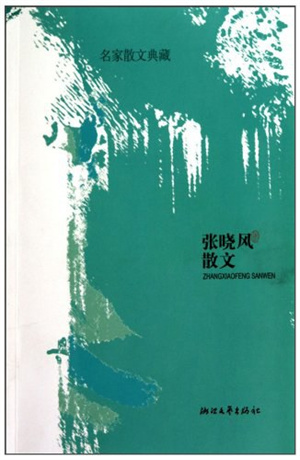
高处何处有(1)
赠给毕业同学
◎ 张晓风
很久很久以前,在一个很远很远的地方,一位老酋长正病危。
他找来村中最优秀的三个年轻人对他们说(2):“这是我要离开你们的时候了,我要你们为我做最后一件事(3)。你们三个都是身强体壮而又智慧过人的好孩子,现在,请你们尽其可能的去攀登那座我们一向奉为神圣的大山。你们要尽其可能爬到最高的、最凌越的(4)地方,然后,折回头来告诉我你们的见闻。”
三天后,第一个年轻人回来了,他笑容满面,衣履光鲜:
“酋长(5),我到达山顶了,我看到繁花夹道,流泉淙淙,鸟鸣嘤嘤,那地方真不坏啊。”
老酋长笑笑说:
“孩子(6),那条路我当年也走过,你说的鸟语花香的地方不是山顶,而是山麓。你回去吧。”
一周以后,第二个年轻人也回来了。他神情疲倦,满脸风霜:
“酋长,我到达山顶了。我看到高大肃穆的松树林。我看到秃鹰盘旋,那是一个好地方。”
“可惜呀!孩子,那不是山顶,那是山腰。不过,也难为你了(7),你回去吧。”
一个月过去了,大家都开始为第三位年轻人的安危担心,他却一步一蹭,衣不蔽体地回来了。他发枯(8)唇燥,只剩下清炯的眼神:
“酋长,我终于到达山顶。但是,我该怎么说呢?那里只有高风悲旋,蓝天四垂(9)。”
“你难道在那里一无所见吗?难道连蝴蝶也没有一只吗?”
“是的,酋长,高处一无所有。你所能看到的,只有你自己,只有‘个人’被放在天地间的渺小感,只有想起千古英雄(10)的悲激心情。”
“孩子,你到的是真的山顶。按照我们的传统,无疑要立你做新酋长,祝福你。”
真英雄何所遇?(11)他遇到的是全身的伤痕,是孤单的长途,以及愈来愈真切的渺小感。
For the Mountaintop
—To Students of the Graduating Class
◎ Zhang Xiaofeng
Long,long ago,in a very,very faraway place,a tribal chief found himself terminally ill.
He summoned three most promising young villagers to his bedside and said,“As I’m leaving you soon,I hope you can do one thing more for me.Young men,you three are all unusually strong and resourceful,so I’d like you to strive to climb that high mountain which we’ve always been worshipping as a sacred place.Now do your best to reach the topmost and most forbidding part of it and then turn back to tell me about your findings.”
Three days later,the first young man returned smartly dressed and said with smiling face,
“Lord,I’ve been to the mountaintop where I saw flowers of all sorts lining both sides of a path,babbling spring water and singing birds.That’s a real nice place.”
The old tribal chief replied smilingly,
“Son,I’ve been there before.The place with singing birds and fragrant flowers,as you mentioned,is not the mountaintop.It’s the foot of the mountain.Now you can leave.”
A week later,the second young man also returned.He looked terribly weary and his face was weather-beaten.
“Lord,I’ve been to the mountaintop where I saw groves of tall,solemn pine trees and vultures circling in the air.That’s a real nice place.”
“What a pity!”said the tribal chief.“Son,you’ve been halfway up the mountain rather than to its summit.But you had a real tough time.Now you can leave.”
A month later,everybody began to worry about the safety of the third young man.However,he finally showed up,hobbling along in rags.His hair was off-coloured and his lips parched,but his eyes were clear and bright.
“Lord,I succeeded in reaching the summit.Well,what shall I say to you about it?There was nothing there but the wailing highland wind and the blue sky hanging over the land.”
“So you saw nothing at all?Not even a butterfly?”
“No,lord,nothing.All you can see is yourself.You feel how insignificant you are in this infinite universe and how sorrowful and agitated you are at the thought of heroes through the ages.”
“Son,you’ve reached the real mountaintop.According to our tradition,you’ll undoubtedly be made our new tribal chief.My best wishes to you.”
What makes a real hero? A real hero has cuts and bruises all over his body,he is all alone on a long journey and he feels with increasing sincerity how small he is.
《高处何处有》是台湾著名女作家张晓风写的一篇“英雄赞”。文章虽短,但含义深远,耐人寻味。作者用一个小故事,描述这样一件事:面对一个崇高目标,有的人原地不动,徘徊不前,有的人不堪艰险,半途而返,一个真正的英雄却坚持到底,终于登上高峰。他不仅有向上进取的精神,特立独行,还有高瞻远瞩的胸襟,心境开阔,念及茫茫宇宙和“千古英雄”而深感自己很“渺小”。
注释
(1) 题目《高处何处有》未直译为Where to Find the Mountaintop,现按“攀登高峰”之意译为For the Mountaintop。
(2)“他找来村中最优秀的三个年轻人对他们说……”译为He summoned three most promising young villagers to his bedside and said…,其中把“村中最优秀的三个年轻人”译为three most promising young villagers,比three most promising young men of the village简练。又,to his bedside是译文中的添加词,原文虽无其词而有其意。此句也可译为He called together three most promising young villagers to hear his last words…。
(3)“为我做最后一件事”可直译为to do the last thing for me,但the last thing也可理解为“最不愿意干的事”,故译to do one thing more for me或to do one more thing for me。
(4)“最凌越的”意即“最难通过的”、“最险恶的”,故译为most forbidding。
(5)“酋长”未直译为tribal chief,改用Lord,因过去英语中常用它直接尊称拥有权势者或统治者。
(6)“孩子”可译为young man,今译Son,因英语中年长者常用它称呼男孩或年轻男子。
(7)“不过,也真难为你了”可译为But you had a real tough time或But you really had a hard time、But you were really hard put to it等。
(8)“发枯”可按“头发变了色”译为His hair was off-coloured。
(9)“蓝天四垂”可按“蓝天笼罩大地”译为the blue sky hanging over the land。
(10)“千古英雄”可按“历代英雄们”译为heroes through the ages或heroes in history。
(11)“真英雄何所遇?”可按“怎样才算是真英雄?”译为What makes a real hero?。






